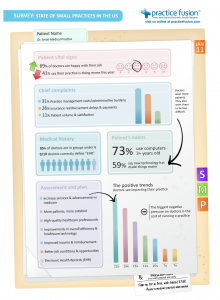 While 41% of small physician practices – defined as those with 9 or fewer physicians – are doing ‘worse’ than last year, doctors are generally enthused by new technology, based on Practice Fusion‘s 2011 State of the Small Practice survey.
While 41% of small physician practices – defined as those with 9 or fewer physicians – are doing ‘worse’ than last year, doctors are generally enthused by new technology, based on Practice Fusion‘s 2011 State of the Small Practice survey.
The key challenges facing doctors in small practices are the costs of operations and administrative burdens (cited by 31% of small practice physicians) and insurance reimbursement delays and payments, noted by 1 in 4 doctors in small settings.
59% of doctors in small practices said that new technology such as electronic health records (EHRs), websites and smartphones have “made things easier” for their practices. 28% said these kinds of technologies have made their practice lives “more difficult.” 13% said they’ve had “no impact” on practicing medicine. The infographic illustrates some of the survey findings.
Overall, 73% of doctors in small practices are using computers that are over three years old. About 1 in 2 physicians in small practices said their computers were 3 to 4 years old. For 1 in 4 doctors, their computers were 5 or more years old.
The survey sample included doctors in practices with 1 to 9 practicing physicians. 52% of the survey sample were in practices 1-3 doctors; 33% had 4-6 doctors; 15% were in practices with 7-9 physicians.
Health Populi’s Hot Points: As we approach the annual meeting of HIMSS, the Healthcare Information and Management Systems Society, we’ll be seeing more surveys like this that help to paint the current picture of health IT adoption among providers, driven by incentives from the HITECH Act.
Another survey was published this week from the Medical Group Management Association (MGMA) which found that physician practices that spent more on information technology had better financial performance than those who spent less — except for multispecialty practices. Those doctors who spent more on health IT also had less bad debt to fee-for-service patients per full time physician. These results came out of the MGMA 2010 Cost Survey.
We’ll see more surveys like these in the coming weeks leading up to HIMSS. If surveys provide more evidence shows that the adoption of health information technology can lower the cost of medical practice and improve the work-lives and -flows of physicians, adoption will follow.




 I'm in amazing company here with other #digitalhealth innovators, thinkers and doers. Thank you to Cristian Cortez Fernandez and Zallud for this recognition; I'm grateful.
I'm in amazing company here with other #digitalhealth innovators, thinkers and doers. Thank you to Cristian Cortez Fernandez and Zallud for this recognition; I'm grateful. Jane was named as a member of the AHIP 2024 Advisory Board, joining some valued colleagues to prepare for the challenges and opportunities facing health plans, systems, and other industry stakeholders.
Jane was named as a member of the AHIP 2024 Advisory Board, joining some valued colleagues to prepare for the challenges and opportunities facing health plans, systems, and other industry stakeholders.  Join Jane at AHIP's annual meeting in Las Vegas: I'll be speaking, moderating a panel, and providing thought leadership on health consumers and bolstering equity, empowerment, and self-care.
Join Jane at AHIP's annual meeting in Las Vegas: I'll be speaking, moderating a panel, and providing thought leadership on health consumers and bolstering equity, empowerment, and self-care.